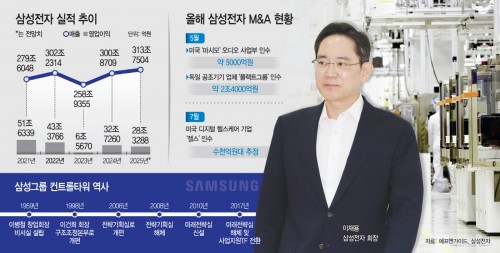 |
Samsung Electronics Chairman Lee Jae-yong has cleared his final legal hurdles, paving the way for bold moves in AI semiconductors and major M&A deals as he reignites his vision for a “New Samsung.”
On July 17, the Supreme Court upheld lower court rulings acquitting Lee of all 23 charges related to alleged accounting fraud and unlawful merger practices involving Samsung C&T and Cheil Industries. This ends a legal battle that began in 2020, and more broadly, a decade-long legal saga stemming from the 2016 political scandal that led to Lee’s imprisonment.
With the judicial risks lifted, Samsung is expected to accelerate investment and strategic initiatives, particularly in semiconductors and future tech. The company is also eyeing large-scale mergers and acquisitions, which had stalled for years during Lee's legal entanglements. Following a February acquittal in appeals court, Samsung already completed three M&A deals in 2025, including a 2.3 trillion won acquisition of German HVAC firm FläktGroup. Still, expectations are rising for even bigger moves, especially in AI, robotics, and next-gen chips.
Lee also faces pressing internal reforms. Analysts expect him to push for a sweeping organizational overhaul, including restoring a group-level control tower, dismantled after the 2016 scandal. Attention is also on whether he will return as a registered board director—currently, he is the only non-registered CEO among the leaders of Korea's top four conglomerates.
Economic and business groups welcomed the ruling. The Korea Employers Federation said it hoped Lee’s leadership would now "drive innovation and investment for global competitiveness and national economic revival." The Korea Chamber of Commerce and Industry added that lifting Samsung’s legal risks would positively impact the broader economy.
However, some industry voices called for reform of court practices, criticizing what they view as automatic appeals to the Supreme Court that prolong trials unnecessarily. One business official noted, “The government’s judicial reform should begin by breaking with outdated customs like mechanical appeals after the second trial.”
Samsung Electronics, which had long been weighed down by the legal uncertainty, is now poised for a full return to form. Once-dominant in DRAM, the company lost its top spot to SK hynix earlier this year. Its consumer electronics and smartphone divisions are also under pressure from weakened global demand, aggressive Chinese competitors, and trade headwinds from the U.S. Its estimated second-quarter operating profit is just half of what it was a year ago.
In this context, industry experts say Lee must now present a distinct, forward-looking vision of his own. “Samsung has traditionally grown based on hardware like home appliances and chips,” said Hong Ki-yong, business professor at Incheon National University. “Now that the legal issues are over, Lee must drive a shift toward AI and software. A strong control tower is essential for synergy across Samsung’s diverse businesses, and returning as a registered board member would help him lead this transformation more decisively.”
Most Read
-
1
-
2
-
3
-
4
-
5
-
6
-
7





















